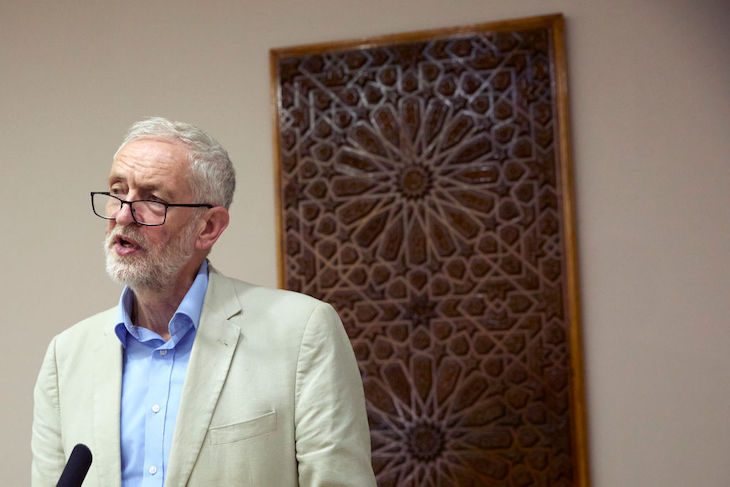Both domestically and internationally, Labour party leader Jeremy Corbyn presents himself as a friend to Muslims, aware of and sympathetic to the problems they face. And superficially his presentation is valid. In stark contrast to his problems with the Jewish community, Corbyn does seem at ease with Muslims – he supported the community after Islamophobic attacks and frequently visits Mosques around the UK. Internationally, he can also point to his long record of support for the Palestinian cause. But amid speculation that Boris Johnson will call a general election later this year, and with the prospect that Jeremy Corbyn could soon be in power, it is worth scrutinising the Labour leader’s relations with the Muslim community more closely.
First, we need to be clear: Corbyn only supports some Muslims in the same way that he only supports some Jews. If you are Jewish and reject the state of Israel, you are perfectly acceptable to the Labour leader, as you have passed the key test – you no longer back what he sees as an imperialist regime. But if you do support Israel, then you lose your right to complain about anti-Semitism.
Less blatantly, Corbyn applies the same logic to Muslims. Corbyn’s model of the world is entirely binary, with anti-imperialists on one side and imperialist states – like the US, or the West as a whole – on the other. The list of anti-imperialist states varies but it often includes Iran, Venezuela, Syria, Russia, and China. And here lies the problem: if you are a Muslim and are victimised by one of these states, then you get little to no support from Corbyn. You are not suffering from the actions of an autocratic regime; you have become a pawn of imperialism. In effect, in Corbyn’s world, the nature of your oppressor matters.
So his much-vaunted support for the Palestinians is actually conditional. If Palestinians support the anti-Assad resistance in Syria, then they are not worth the UK’s support. They have crossed the line from being oppressed by the imperialist state of Israel to opposing the supposedly anti-imperialist Bashar al-Assad regime.
This distinction can also be seen in his response to two states that are currently carrying out a sustained assault on their Muslim minorities. In Myanmar, where more than 600,000 members of its Muslim Rohingya minority have fled from a concerted ethnic cleansing campaign, he has at least acknowledged the crimes and called on Myanmar’s leader Aung San Suu Kyi to use her influence to allow them to return to their homes. His response has been limited, but at least he is clear that what is happening is wrong and the Rohingya deserve support. But, of course, Myanmar has no anti-imperialist credentials, so voicing support with oppressed Muslims there is not inconsistent with his worldview.
Contrast this with Corbyn’s reaction to China’s treatment of its Uighur Muslim minority. It is clear the Chinese are determined to break the cultural links between the Uighurs and Islam. Reports of detention, brutality and mass surveillance of Uighurs are widespread. Corbyn’s favourite newspaper, the Morning Star, repeats Chinese claims that the crackdown on Uighurs is not repression but a necessary response to a violent insurgency. It downplays the closure of mosques by insisting that there are still ‘24,400 mosques across Xinjiang – one for every 530 Muslims.’ And from Corbyn himself? Near-complete silence.
In 2015, he sought to use private meetings with high-ranking Chinese officials to discuss human rights issues, but since then? Nothing. A systemic persecution of Muslims, far more authoritarian than the worst Israeli actions toward the Palestinians, has elicited no comment from Corbyn, no statements of support. China’s inclusion in Corbyn’s anti-imperialist club largely exempts it from criticism. In the same way, he has said almost nothing about the suffering of the Muslim Tatar community in Crimea since the peninsula was annexed by another member of the supposed anti-imperialists, Vladimir Putin’s Russia.
There is a consistency in Corbyn’s treatment of Muslims. The suffering of Muslims does matter to him, as long as it is at the hands of Western imperialism or one of its client states, such as Israel or Saudi Arabia. Victims of Iran’s proxy forces in Iraq and Syria, Palestinians attacked by the Assad regime, and the Uighur community stripped of all its rights do not matter. They are unfortunate enough to be attacked by states that Corbyn believes are anti-imperialist.
Dr Azeem Ibrahim is a Research Professor at the Strategic Studies Institute US Army War College and author of Prospective Foreign Policy of a Corbyn Government and US National Security Implications






Comments